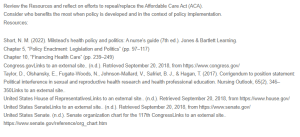Politics and the Patient Protection and Affordable Care Act
The efforts to repeal and replace relative to the ACA were crucial to the cost-benefit analysis for legislators’ reelection. The first order of business for any legislator is reelection; therefore, their position on healthcare reform emanated from the will and makeup of their constituencies. Pressures from the conservative districts, when voters favored limited government and lower taxes, made the support of repealing ACA a politically astute decision since this would appeal to their base support and provide an opportunity for reelection (Mariner, 2020). Where voters criticize the ACA as an overreach of federal authority and financially burdensome, legislators oppose the ACA to align with voters’ views. Contrarily, in districts where the ACA was embraced due to the widely acknowledged benefits of Medicaid expansion or subsidies given to low-income people, legislators also faced the imposition of a potential political cost for their vote to be used to repeal the ACA, as an endorsement of the repeal might bring on intense backlash from constituents who have gained value from the law and hence tie up any intentions of reelection (The White House, 2023).
In order to make decisions about national policies, legislative leaders have to delve into research to anticipate the political consequences of their actions. For instance, Medicare and Medicaid policies often affect sizeable parts of the electorate, including older adults and lower-income voters (Baicker & Finkelstein, 2019). Legislative leaders contemplating reforms to either program will pay close attention to how the changes will impact their voter base. This would be politically unfavorable should a significant percent of their constituents rely on Medicaid, as they would have lost potential voters to re-elect them. Public opinion surveys, constituent correspondence, and interest group advocacy largely determine such moves. There is a significant balance between party ideologies and the will of the voters, as a selection of party agendas over the will of the voters will deny the political franchise to the leaders. This fragile balance came to the fore in the various efforts to repeal and replace the ACA, where many legislators flinched from full repeal out of fear of political blowback from voters who benefited from its provisions.
In summary, the intersection of voter views and political survival significantly influences national policy recommendations. In this case, legislators must balance any policy gains against the potential political costs, as reelection prospects are advanced and at the heart of decision-making.
References
Baicker, K., & Finkelstein, A. (2019). The impact of Medicaid expansion on voter participation: evidence from the Oregon health insurance experiment. Quarterly Journal of Political Science, 14(4), 383–400. https://doi.org/10.1561/100.00019026
Mariner, W. (2020, September 8). The Affordable Care Act: Up for a final vote? Www.americanbar.org. https://www.americanbar.org/groups/crsj/publications/human_rights_magazine_home/health-matters-in-elections/the-affordable-care-act/
The White House. (2023, February 28). Fact sheet: The Congressional Republican agenda: Repealing the Affordable Care Act and slashing Medicaid. https://www.whitehouse.gov/briefing-room/statements-releases/2023/02/28/fact-sheet-the-congressional-republican-agenda-repealing-the-affordable-care-act-and-slashing-medicaid/
ORDER A PLAGIARISM-FREE PAPER HERE
We’ll write everything from scratch
Question
Review the Resources and reflect on efforts to repeal/replace the Affordable Care Act (ACA).
Consider who benefits the most when policy is developed and in the context of policy implementation.
Resources:

Politics and the Patient Protection and Affordable Care Act
Short, N. M. (2022). Milstead’s health policy and politics: A nurse’s guide (7th ed.). Jones & Bartlett Learning.
Chapter 5, “Policy Enactment: Legislation and Politics” (pp. 97–117)
Chapter 10, “Financing Health Care” (pp. 239–249)
Congress.govLinks to an external site.. (n.d.). Retrieved September 20, 2018, from https://www.congress.gov/
Taylor, D., Olshansky, E., Fugate-Woods, N., Johnson-Mallard, V., Safriet, B. J., & Hagan, T. (2017). Corrigendum to position statement: Political interference in sexual and reproductive health research and health professional education. Nursing Outlook, 65(2), 346–350Links to an external site..
United States House of RepresentativesLinks to an external site.. (n.d.). Retrieved September 20, 2018, from https://www.house.gov/
United States SenateLinks to an external site.. (n.d.). Retrieved September 20, 2018, from https://www.senate.gov/
United States Senate. (n.d.). Senate organization chart for the 117th CongressLinks to an external site.. https://www.senate.gov/reference/org_chart.htm

